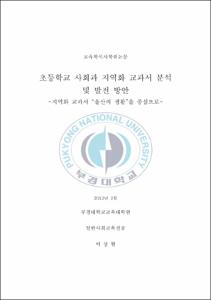초등학교 사회과 지역화 교과서 분석 및 발전 방안
- Abstract
- Abstract
Analysis and Improvement of Localized Textbooks of Elementary School Social Studies
Lee Sang-hyeon
Major in Social Studies Education
Graduate School of Education
Bukyong National University
Supervised by Prof. Lee Dae-hee
Social studies is a subject focusing on fostering capability to respond to new changes in society actively and right qualification as democratic citizens who can make reasonable decisions.
For such purpose, social studies have textbooks localized for each region. Localization of textbooks enables fresh materials directly met in daily life to be used in classes, thus increasing learning effects, deepening understanding of locality, and promoting love of one's home.
Such localization has been discussed since the beginning of social studies education, and in particular, the 7th Curriculum enabled localized textbooks of social studies for the third grades to be published by local education offices freely and as for the fourth grades, local textbooks were published as approved books for relevant cities and provinces. The localized textbooks are sufficiently helpful in that efforts and burdens of re-structuring curriculum for localized learning are resolved and that localization of curriculum can be practically conducted in the education fields.
However, although localized textbooks have been developed to reflect local properties and desires of learners and local society according to the localization logic of social studies curriculum, their status has not been established sufficiently as the localized textbooks fail to function as aid textbooks for teachers and students in the field. Also, such textbooks have not met the purpose of the localization because of lack of teachers' understanding of localization, immaturity of conditions, and difficulty in publishing localized textbooks and materials. In this context, it is needed for the textbooks to be structured to function for the purpose of the development in the field.
The authors in this study present directions to enhance efficiency and consistent development of the localized curriculum based on analysis of textbooks and questionnaires.
First, various materials including photos, pictures, maps, graphs, and tables have been presented to enhance learning efficiency in the localized textbooks. In addition to it, it is needed to provide learning materials with sense of reality by development of multimedia materials though they are not possible to be included in the textbooks.
Second, although the existing localized textbooks present sufficient materials, photo materials sometimes fail to fulfill the function due to limitations in paper textbooks, and as shown in the questionnaires, students rather than teachers do not have interest in the localized textbooks. It is needed to enlarge the size of the textbooks and to present color materials so that students have spontaneous interest.
Third, visiting and learning from voluntary figures who have knowledge and experience in the relevant local is particular effective in the localized learning, but as shown in the questionnaires, this method is the most one in learning. Although it is hard to resolve the problem in the near future in reality, it may be favorable method that personnel infrastructure for localized learning per regions or school districts is organized and supported systematically as a future-oriented measure.
Conclusively, as in all the subject learning, it is hard to resolve insufficiency in localized learning in a short time, but the localized learning may be better in process of finding and resolving existing problems gradually.
- Issued Date
- 2012
- Awarded Date
- 2012. 2
- Type
- Dissertation
- Keyword
- 사회
- Publisher
- 부경대학교 교육대학원
- Department
- 교육대학원 일반사회교육전공
- Advisor
- 이대희
- Table Of Contents
- 차 례
Ⅰ. 서론 1
1. 연구의 필요성과 목적 1
2. 연구의 내용 및 방법 4
Ⅱ.사회과 교육과정 지역화의 의미와 변천과정 5
1. 사회과 교육과정 지역화의 의미 5
가. 지역 및 지역화의 개념 5
나. 지역화의 유형 7
2.사회과 교육과정의 지역화 필요성 11
가. 자기화의 원리의 실현 11
나. 정체성의 형성 12
다. 세계화-지역화와 다중 시민성의 함양 12
라. 사회과 교육의 내용과 방법의 원천 13
3. 사화과 교육과정 지역화의 변천과정 13
가. 교수요목의 시기(1946~1954) 14
나. 제1차 교육과정의 시기(1954~1963) 14
다. 제2차 교육과정의 시기(1963~1973) 15
라. 제3차 교육과정의 시기(1973~1980) 15
마. 제4차 교육과정의 시기(1981~1987) 16
바. 제5차 교육과정의 시기(1987~1992) 17
사. 제6차 교육과정의 시기(1992~1997) 18
아. 제7차 교육과정의 시기(1997~2007) 19
자. 제7차 개정교육과정(2007~ 현재) 20
Ⅲ. ‘울산의 생활’ 지역화 교과 분석 26
1. 사회과 교과 내용 체계 및 단원 비교 분석 26
2. ‘울산의 생활’ 구성 내용 분석 29
가. ‘아름답고 살기좋은 울산’ 단원 29
나. ‘주민참여로 발전하는 울산’ 단원 33
다. ‘더불어 살아가는 우리 울산’ 단원 37
Ⅳ. 지역화 교과에 대한 설문조사 결과 분석 42
1. 조사 설계 42
가. 조사대상 42
나. 조사도구 42
다. 표본의 일반적 특성 42
2. 설문조사의 결과 분석 43
가. 교과운영에 관련된 사항 43
나. 교과학습에 관련된 사항 47
다. 교과내용에 관련된 사항 51
Ⅴ. 결론 및 제언 58
1. 결론 58
2. 제언 60
※참고문헌 62
[부록] 설문지 65
- Degree
- Master
- Files in This Item:
-
-
Download
 초등학교 사회과 지역화 교과서 분석 및 발전 방안.pdf
기타 데이터 / 735.94 kB / Adobe PDF
초등학교 사회과 지역화 교과서 분석 및 발전 방안.pdf
기타 데이터 / 735.94 kB / Adobe PDF
-
Items in Repository are protected by copyright, with all rights reserved, unless otherwise indicated.